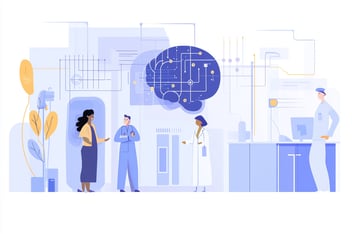Funding Opportunities for Digital Telephony Upgrades in GP Practices: Tackling the 8am Rush

The daily 8am rush - as callers scramble for the daily release of GP appointments - at practices has become a significant challenge for both patients and healthcare staff across England. NHS England has recognised this pressing issue and is actively supporting digital transformation in healthcare, particularly through improvements in call handling systems.
With new funding initiatives being rolled out, practices who haven't embraced digital phone lines yet still have opportunities to receive funding to upgrade to digital telephony systems and enhance patient access.
For practices already using digital phone lines, it is clear that this is only part of the solution. In many cases, digital phones have only shifted the bottleneck from phone technology to call handling capacity. Thankfully, there are solutions, which are addressing this challenge head-on and funding available for them.
Understanding the 8am Rush in GP Practices
Many people remember the days of easy access to their family doctor by phone. Too often these days the task of securing a GP appointment can prove extremely challenging for those reliant on the phone as their main communication channel.
The morning rush at GP practices represents one of the most challenging aspects of primary care delivery. Staff answering calls often find themselves overwhelmed, while patients face lengthy wait times and frequent engaged tones - sometimes to only get through and find that all appointments are accounted for, and they need to call back the next day!
This situation particularly affects vulnerable patients who may struggle to get through to their local GP team. Offering vulnerable patients the means to connect directly with a call handler at the surgery has been shown to reduce abandoned call rates and improve access to care.
There can be added frustration for frequent callers, who get caught up in the daily rush on a regular basis. Most frequent callers, if not booking an appointment, aim to avoid this 8am rush, but the fact remains - staff and phone lines are stretched to the extreme at this time, and often far beyond, each day.
NHS Funding for GP Phone Systems
NHS England has already delivered a comprehensive funding initiative aimed at helping practices upgrade their phone systems in 2023-24. This program specifically targeted:
-
Practices with non-compliant systems lacking enhanced reporting capabilities
-
Systems that cannot manage multiple calls effectively
-
Practices needing to implement cloud-based systems
Digital Telephony System Benefits
National Director for Primary Care, Dr Amanda Doyle, has emphasised how digital transformation is reshaping general practice. Dr Amanda Doyle said "Almost every GP practice now has access to modern phone technology, enabling them to manage multiple calls effectively and provide better service to patients."
In some cases, the implementation of upgraded phone systems has shown remarkable results already. For example, Abbey Medical Centre reported a 90% reduction in abandoned calls after their system upgrade. Other notable improvements include:
-
Increased patients' ability to reach their general practice
-
Better management of prescription medication requests
-
Improved appointment usage reducing waiting times
High Costs and Limitations of Digital Telephony Systems
The NHS England's rollout of digital phone systems in over 5,800 GP practices was a theoretical improvement in capacity and accessibility, with cloud-based telephony solutions offering expanded call lines to eliminate engaged signals, ensuring a smooth flow of incoming calls.
However, digital phone lines are only part of the solution that many surgeries need. Digital lines may enable a GP surgery to receive multiple inbound calls at once, but without the staff to answer these all at once, patients are typically placed in a call queue.
The BMA has also warned that new cloud-based telephony systems are significantly increasing the cost of managing calls within practices. When a surgery looks to upgrade systems to digital phones, there should be a careful evaluation of the total cost per call alongside potential savings from improved efficiency and resource allocation.
Thankfully, there are digital solutions out there which remove the need for costly cloud-based telephony, answering patients calls within 3 rings.
Lower Cost and Higher Impact: AI Solutions for Call Handling
Artificial Intelligence (AI) solutions for call handling, such as QuantumLoopAi, provide human-like conversational engagement with callers - answering 100% of calls within 3 rings, and a virtually unlimited number of calls at the same time.
The majority of calls into a surgery can be automatically handled by an AI solution which quickly identifies whether the call needs to be redirected to 999 or 111 for immediate response, or guides the caller to provide information which is written into an appointment form (e.g. Accurx) leading to appointments accounted automatically by the system.
In some cases, it may be more appropriate for the AI call handling solution to transfer the call to a human. But more than 80% of calls can be handled automatically, allowing reception and admin staff to focus on improved care navigation - enhancing efficiency and reducing staff burnout.
Some of the benefits from AI call handling with QuantumLoopAi are:
-
82% of patient calls handled automatically
-
128% improvement in conversion from call to form-fills
-
Dropped calls down by 87%
-
Over 90% of patients note a positive improvement to their experience
-
Cost savings
-
Support for Capacity and Access Payments
Take a look at the case studies for QuantumLoopAi to find out more, or book a demo today.
Funding Opportunities for Digital Infrastructure in GP Surgeries
In addition to specific funding for digital telephony, GP surgeries in the UK may access funding for broader digital infrastructure improvements, including AI-enabled solutions like automated call handling, through several NHS England digital transformation initiatives in this financial year and beyond.
NHS England Funding Sources and Amounts
GP teams looking to address call handling concerns have access to funding via streams mentioned within the general practice improvement programme (GPIP), such as the Delivery Plan for Recovering Access to Primary Care (PCARP). Specifically, Annex 3: 2024/25 funding streams.
Additional support for which can be used to upgrade GP telephone systems may come from areas such as the following.
-
Capacity and Access Payment (CAP): Total CAP funding increased by £46 million to £292 million for 2024/25. 70% of this funding is paid to PCNs without reporting requirements. The remaining 30% is available once practices implement components of the Modern General Practice Access model, including digital telephony solutions.
-
NHS England Support: NHS England is providing funding and support for GP practices to secure digital tools, including demand and capacity management tools. Integrated Care Boards (ICBs) are working with PCNs and GP practices to access this funding for appropriate digital solutions.
-
Government Pledges: The previous UK government allocated £3.4 billion to boost NHS productivity through technology, with AI development as part of its focus.
-
NHS Digital Transformation Budget: Currently, only 5% of the Department of Health and Social Care’s budget is directed towards capital spending, with around 10% of that going to IT and software upgrades.
Challenges in Accessing Funding
-
Funding Allocation: Digitally mature NHS trusts have historically received more significant funding, potentially disadvantaging GP surgeries.
-
Eligibility and Uptake: Low uptake for past funding schemes often resulted from complex eligibility requirements, deterring many GP surgeries from applying.
-
Variability in Digital Proficiency: Digital readiness varies widely across UK GP surgeries, affecting some practices’ ability to adopt and maintain new technology.
-
Interoperability of Systems: Current GP systems often lack compatibility, which complicates the implementation of new digital technologies like AI-driven call handling.
-
Basic Infrastructure Gaps: Many GP surgeries lack fundamental IT resources, such as high-speed broadband or reliable Wi-Fi, essential for supporting advanced digital solutions.
Recommendations for Overcoming Barriers
To support GP surgeries in adopting digital infrastructure, experts recommend:
-
Prioritised Funding for Less Digitally Mature Practices: To bring all surgeries to a foundational digital standard.
-
Enhanced GP IT Operating Model: Providing consistent, annual investment in modern IT infrastructure to sustain a high standard of digital care.
-
Funding for AI and Future Technologies: Recognising the evolving costs of advanced technology solutions, such as AI diagnostics, and ensuring funding keeps pace with inflation.
-
Equipping All Practices for Digital Solutions: Ensuring every practice has the necessary equipment and digital facilities to utilise IT solutions effectively.
Navigating Funding Options
For GP surgeries interested in integrating AI solutions like automated call handling, it’s advisable to engage with local Clinical Commissioning Groups (CCGs) or Integrated Care Systems (ICSs). These organisations can provide guidance on available funding schemes and help navigate the application process.
At QuantumLoopAi, we can provide insight into how other GP surgeries have accessed funding for intelligent call automation and used these systems to support ongoing cost savings.
For practices looking to upgrade their systems, key considerations include when planning to receive funding are:
-
Assessment of current system compliance
-
Consultation with local Integrated Care Boards
-
Staff training requirements
-
Integration with the primary care recovery plan or Delivery Plan for Recovering Access to Primary Care (PCARP)
Conclusion

The NHS England funding for general practices to move from analogue to digital phone systems may have reduced patient frustrations with engaged lines, but callers now face call queues instead.
There is still a significant opportunity for practices to modernise their communication infrastructure to answer calls from more patients during the 8am rush and improve patient access to care.
Surgeries should look beyond modern digital telephony systems to think holistically about how changes can be made to improve patient experience through call handling automation. By reducing the need for reception and admin staff to handle calls directly, surgeries can free up resources to improve care navigation and provide greater support for emerging needs, like mental health specialists and community services access.
Funding for these changes is available, even if is not explicitly outlined in places like the GP Access Recovery Plan. Working with an expert service provider, such as QuantumLoopAi, can help identify areas where additional funding may come from to support the implementation and running of automated intelligent call handling solutions to tackle the 8am rush.





